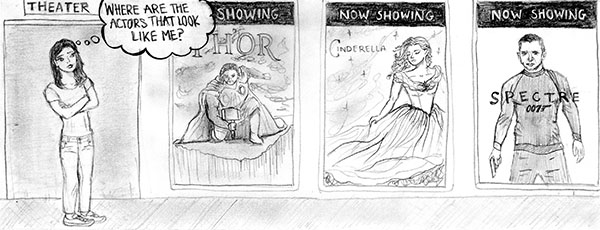Hollywood needs improvement in representation

Illustration by Sophia Lau
November 10, 2017
Currently there have been a lot of live-action remakes of Disney princess movies, and Mulan is one I am extremely looking forward to. While I am anxiously waiting for Mulan to dramatically slide down The Great Stone Dragon and contemplate her life’s meaning just like me, there have been controversies regarding whitewashing the characters that I am not a fan of. In fact, there have been multiple issues surrounding wage gap, whitewashing and Asian representation in Hollywood that have made the careers of Asian actors ten times more difficult.
This problem didn’t really hit me until Hawaii 5-0, a show that I have been watching since I was an awkward 10 year-old little girl, eliminated the two main Asian characters off the show. My Asian pride kicked in immediately. I’ve realized that Asian actors are being underrepresented and underpaid in Hollywood.
Although these two characters made up the entire storyline of the show, they still received a lesser salary than the two white co-stars. According to Daniel Dae Kim of Hawaii 5-0, he and Asian costar Grace Park received 10-15% less than the rest of the cast. After seven seasons the two actors finally quit.
To say I am disappointed is an understatement. I couldn’t imagine filming a television show in Hawaii without any non-white actors. Instead, they introduced a Caucasian cast from New Jersey to speak the language and celebrate the Hawaiian culture.
To be honest, I don’t understand why this is happening to begin with. Why are the Asian actors not paid the same amount as the white actors? Why are directors unable to negotiate fair salaries?
The producers believe that the Asian actors just aren’t as talented as the rest of the cast. During the filmmaking process of Flash Boys, which surrounds the phenomenon of high frequency trading in the U.S. equity market, screenwriter Aaron Sorkin argued they had difficulty with casting because “there aren’t any Asian movie stars,” according to an article by the New York Times.
*cough* Jamie Chung, George Takei, Ki Hong Li, and Arden Cho just to name a few. Who can forget Kira Yukimura in Teen Wolf or Minho from The Maze Runner? Nonetheless, the directors of Flash Boys still believed they couldn’t find an Asian lead ‘movie star’ and had to end production of the movie.
I refuse to believe that there are no Asian actors that are as talented as Scarlett Johansson to play Major in Ghost in the Shell or Emma Stone to play Ng in Aloha. I can’t even begin to explain how disappointed my brother and I were to see our favorite manga, Death Note, played by Caucasian actor Nat Wolff. I’m sorry, but someone who was in The Naked Brothers Band is not fit to play someone like Light Yagami.
While these issues are very upsetting to the Asian community, many others disagree. Some are asking, “Why is it not okay for Caucasian actors to play traditionally Asian roles when Asian actors can play traditionally white roles?” Underrepresentation.
While Caucasian actors have a wide variety of opportunities in Hollywood, Asian actors have to take advantage of every new role because opportunities for them are very scarce. According to a study by Professor Stacy L. Smith, 40 of the top 100 films of 2014 had no Asian characters.
Whitewashing an Asian character is not going to attract a wide audience and can actually ruin the origins of a film. Not only would I enjoy watching Jamie Chung or Malese Jow play Mulan, but seeing Asians take part in Hollywood and media production is a tremendous sign of diversity spreading throughout our nation.
According to the University of Southern California’s recent study on diversity in entertainment, only 5.1% of Asian actors make up the big screen. This can’t continue; I don’t want to see a Caucasian Sailor Moon popping up on my Netflix account, and I really hope the rumors of Jennifer Lawrence playing Mulan aren’t true.


